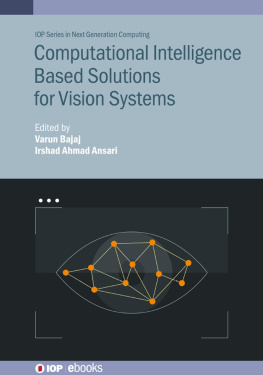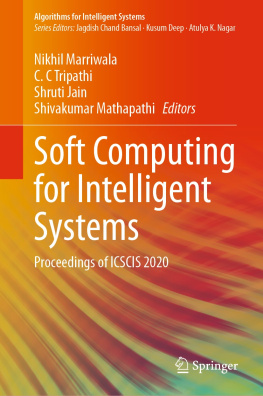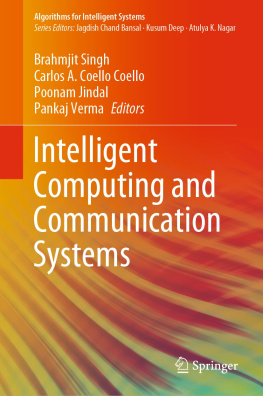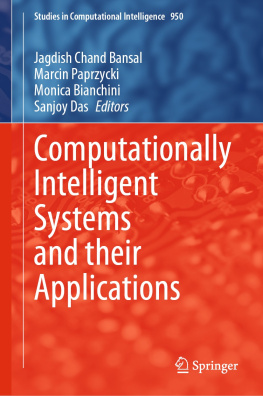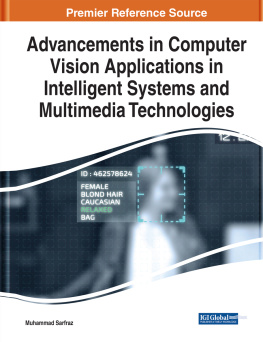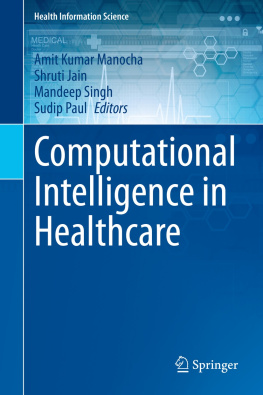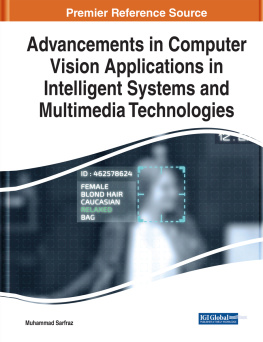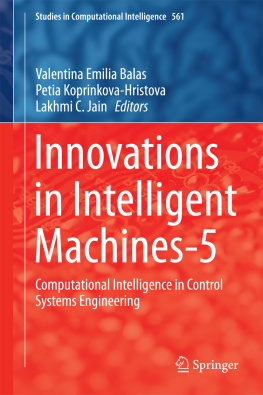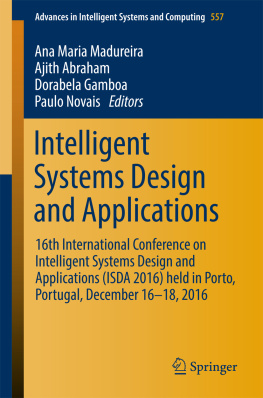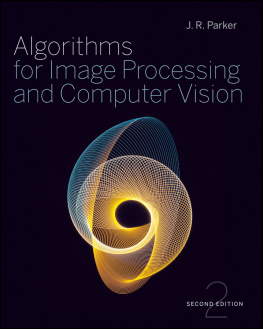Contents
Contents
Ankit Charan Janbandhu, Sachin Sharma, Irshad Ahmad Ansari and Varun Bajaj
Virginia Riego del Castillo and Lidia Snchez-Gonzlez
K S Kavitha and Megha P Arakeri
Orhan Yaman, Sengul Dogan, Turker Tuncer and Abdulhamit Subasi
Chaitanya Krishna Pasula and V M Manikandan
Bhan Singh, Divyanshu, Mayur Kashyap, Himanshu Gupta and Om Prakash Verma
Areesha Anjum and Saiful Islam
Loris Nanni, Daniela Cuza, Alessandra Lumini and Sheryl Brahnam
Ranita Khumukcham and Gaurav Saxena
Monali Gulhane
Siddarth Shah, Dipen Gohil, Rutvik Shah and Manan Shah
Computational Intelligence Based Solutions for Vision Systems
Edited by
Varun Bajaj and Irshad Ahmad Ansari
Electronics and Communication Engineering, PDPM Indian Institute of Information Technology Design and Manufacturing, Jabalpur, India
IOP Publishing, Bristol, UK
IOP Publishing Ltd 2022
All rights reserved. No part of this publication may be reproduced, stored in a retrieval system or transmitted in any form or by any means, electronic, mechanical, photocopying, recording or otherwise, without the prior permission of the publisher, or as expressly permitted by law or under terms agreed with the appropriate rights organization. Multiple copying is permitted in accordance with the terms of licences issued by the Copyright Licensing Agency, the Copyright Clearance Centre and other reproduction rights organizations.
Certain images in this publication have been obtained by the authors from the Pixabay website, where they were made available under the Pixabay License. To the extent that the law allows, IOP Publishing disclaims any liability that any person may suffer as a result of accessing, using or forwarding the images. Any reuse rights should be checked and permission should be sought if necessary from Pixabay and/or the copyright owner (as appropriate) before using or forwarding the images.
This book contains photographs of identifiable persons. Consent to print these photographs has been obtained by the authors from the individuals.
Permission to make use of IOP Publishing content other than as set out above may be sought at .
Varun Bajaj and Irshad Ahmad Ansari have asserted their right to be identified as the authors of this work in accordance with sections 77 and 78 of the Copyright, Designs and Patents Act 1988.
ISBN 978-0-7503-4821-8 (ebook)
ISBN 978-0-7503-4819-5 (print)
ISBN 978-0-7503-4822-5 (myPrint)
ISBN 978-0-7503-4820-1 (mobi)
DOI 10.1088/978-0-7503-4821-8
Version: 20220501
IOP ebooks
British Library Cataloguing-in-Publication Data
Published by IOP Publishing, wholly owned by The Institute of Physics, London
IOP Publishing, Temple Circus, Temple Way, Bristol, BS1 6HG, UK
US Office: IOP Publishing, Inc., 190 North Independence Mall West, Suite 601, Philadelphia, PA 19106, USA
IOP Series in Next Generation Computing
Series editors
Prateek Agrawal
University of Klagenfurt, Austria and Lovely Professional University, India
Anand Sharma
Mody University of Science and Technology, India
Vishu Madaan
Lovely Professional University, India
About the series
The motive of this series is to develop a trusted library on advanced computational methods, technologies and their applications.
This series focuses on the latest developments in next generation computing, and in particular on the synergy between computer science and other disciplines. Books in the series will explore new developments in various disciplines that are relevant for computational perspective including foundations, systems, innovative applications and other research contributions related to the overall design of computational tools, models and algorithms that are relevant for the respective domain. It encompasses research and development in artificial intelligence, machine learning, block chain technology, quantum cryptography, quantum computing, nanoscience, bioscience-based sensors, IoT applications, nature inspired algorithms, computer vision, bioinformatics etc. and their applications in the areas of science, engineering, business and social sciences. It covers a broad spectrum of applications in the community, from industry, government, and academia.
The aim of the series is to provide an opportunity for prospective researchers and experts to publish works based on next generation computing and its diverse applications. It also provides a data-sharing platform that will bring together international researchers, professionals and academics. This series brings together thought leaders, researchers, industry practitioners, and potential users of different disciplines to develop new trends and opportunities, exchange ideas and practices related to advanced computational methods and promote interdisciplinary knowledge.
Dedicated to my father the late Mahendra Bajaj and family members.
Varun Bajaj
Dedicated to my lovely daughter Eimaan.
Irshad Ahmad Ansari
Preface
Currently, computational intelligence (CI) is being used in a variety of applications and is thus influencing peoples lives in various ways. The growth in research in advanced computing and respective fields such as intelligent vision systems (IVSs) is assisting people by allowing rapid response and ease of use. The advancement of IVSs depends jointly on the development of advanced computing and knowledge of vision systems. IVSs help to achieve highly efficient performance (comparable to human vision) to allow a profound understanding of different scenarios and applications. IVSs provide the ability to handle and examine the big data generated by vision sensors and make decisions based on specific requirements. CI enables the different issues that influence IVSs and their practical use to be addresssed. Therefore, the merger of CI with IVSs can do wonders for the wellbeing of humans.
In recent times high performance computing has seen continued growth, affecting various fields and changing the computational domain altogether for the betterment of human life. Computer vision can be deemed as one of the most important fields which affects human life in a significant way. CI based computing can be very helpful in determining solutions for advanced vision systems as they required high-end processing capabilities. The in-depth analysis of large datasets is the basis for the development of IVSs and the same can be very helpful in vision and surveillance applications. Deep computational architecture and low level feature extraction, generation and understanding can provide new directions for the current research of vision systems.
Computer vision is a significant technology covering diverse fields. It plays an important role in the fields of information technology and intelligence. The combination of vision systems with CI is giving rise to IVSs. Computer vision is affecting different areas of human life such as surveillance, medical assistance, remote sensing, target detection, tracking, etc.
Computer vision plays a significant role in industry as well. Intelligent systems and computer vision find applications in various industrial phases such as the pre-processing, production and testing phases. Computer vision techniques are an important component of security and surveillance systems. An intelligent vision system using visible and infra-red sensors can track illegal activities and alert the user in the case of any incidents.
Considering the future issues of high performance computing and the need for IVSs, this book focuses on the advancements of this domain. This book is made up of contributions by invited research scholars, academic researchers and industry professional related to high performance computing for IVSs and related applications.

